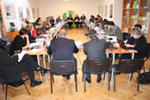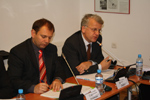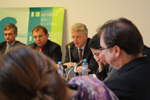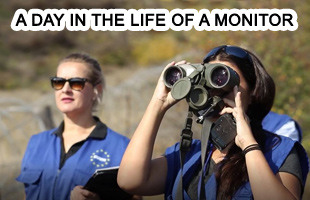The two-day conference was organised by the German foundations Bertelsmann Stiftung and Heinrich Böll Stiftung and was attended by several representatives of International Organisations, the diplomatic corps, think-tanks and NGO:s working in the Southern Caucasus area. Ambassador Haber took part in a panel discussion on the European dimension of international cooperation in the Caucasus.
Mr Haber stated that the main work of the European Union's Monitoring Mission is practical:“Our aim is to create security in the area. This can be done by enhancing cooperation between the law-enforcing bodies on both sides of the administrative boundary line. Our mandate covers all of Georgia, but we are a civilian, autonomous and unarmed mission and we cannot force our way anywhere. We want cooperation.”
The ambassador received several questions during the panel debate. One of the participants compared the several international bodies present in Georgia with a patient at a hospital connected to several life-supporting machines. “What can be done to disconnect the patient from these machines without the patient dying?”
Mr Haber replied that the international bodies in Georgia are cooperating closely on information exchange, but that it is necessary to clearly define the roles of the different organisations. Presently, UN, OSCE and the EU are working in Georgia. The EU has a unique role in this, Ambassador Haber made clear that the EUMM is not “pro-Georgian” or “pro-Russian”: “We are working with all sides towards security on the ground,”he explained.
Mr Haber was asked about the risk of the conflict being kept “frozen” and thus unsolved, and that creating security along the administrative boundary lines actually means recognising them.
“We are aware of this risk. On the theoretical level, no EU member state is planning to recognise Abkhazia or South Ossetia. But in order to create a secure environment on the ground, we need to create clear rules on the issue of the administrative boundary lines. This is a sensitive matter, but from our point of view, the important part is to work towards security”.
Several questions arose on the effectiveness of the EU's work in Georgia and other regions of the area. Ambassador Haber underlined the progress of the EU Monitoring Mission so far;“The Medvedev-Sarkozy plan must be considered a great achievement: it managed to get the Russian troops out of the adjacent areas in ten days. That can't be called anything else but a success.”
 |
 |
 |


